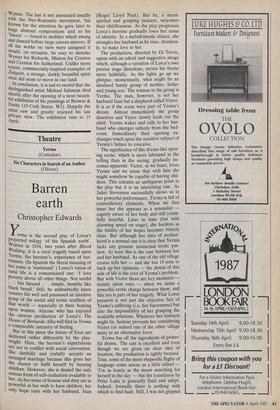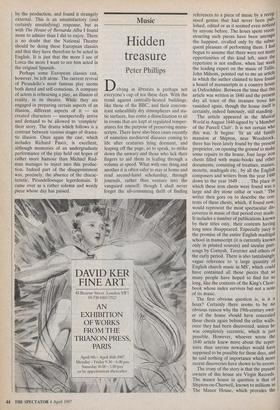Theatre
Yerina (Cottesloe) Six Characters in Search of an Author (Olivier)
Barren earth
Christopher Edwards
17 erma is the second play of Lorca's projected trilogy 'of the Spanish earth'. Written in 1934, two years after Blood Wedding, it is a rural tragedy based upon Yerma, the heroine's, experience of bar- renness. (In Spanish the literal meaning of her name is `wasteland') Lorca's vision of rural life is a romanticised one: 'I love Poverty above all other things. Not sordid • . but blessed . . . simple, humble like black bread.' Still, he undoubtedly knew country life well and possessed an intuitive grasp of the social and erotic conflicts of that world — especially in their bearing upon women. Anyone who has enjoyed the current production of Lorca's The House of Bernarda Alba will find in Yerma a comparable intensity of feeling. But in this piece the forces of Eros are deployed rather differently by the play- wright. Here, the heroine's expectations are not in conflict with social convention. She dutifully and joyfully accepts an arranged marriage because this gives her the chance to fulfil herself by bearing children. However, she is denied the only serious form of self-realisation available to her. As her sense of honour and duty are as Powerful as her wish to have children, her only hope rests with her husband, Juan (Roger Lloyd Pack). But he, a mean- spirited and grasping peasant, welcomes their childlessness. As the play progresses Lorca's heroine gradually loses her sense of identity. In a melodramatic climax, she strangles her husband as he tries, drunken- ly, to make love to her. The production, directed by Di Trevis, opens with an adroit and suggestive image which, although a variation of Lorca's own precise stage directions, serves his theme more faithfully. As the lights go up we glimpse, momentarily, what might be an idealised family group of mother, father and young son. The woman in the group is Yerma. The man, however, is not her husband Juan but a shepherd called Victor. It is as if the scene were part of Yerma's dream. Almost immediately the group dissolves and Victor slowly leads out the child. Yerma wakes and calls to her hus- band who emerges sullenly from the bed- room. Immediately their opening ex- changes touch upon the sensitive subject of Yenna's failure to conceive.
The significance of this dream-like open- ing scene, which is more laboured in the telling than in the seeing, gradually be- comes apparent. Victor, as we learn, loves Yerma and we sense that with him she might somehow be capable of having chil- dren. This remains an ambiguous point in the play but it is an interesting one. As Juliet Stevenson successfully shows us in her powerful performance, Yerma is full of contradictory elements. When we first meet her she appears as a sensualist eagerly aware of her body and still youth fully hopeful. Later in time (but with alarming speed on stage), she hardens as the futility of her hopes becomes bitterly clear. But although her idea of mother- hood is a sensual one it is clear that Yerma lacks any genuine instinctual erotic pas- sion. At least this is the case between her and her husband. As one of the old village crones tells her — and she has 14 sons to back up her opinions — the denial of this side of life is the root of Yerma's problem.
But with Victor there are key moments - mainly silent ones — when we sense a powerful erotic charge between them, and this too is part of her tragedy. What Lorca presents is not just the objective fact of Yerma's suffering (i.e. her barrenness) but also the impossibility of her grasping the available solutions. Whatever her instincts might be, honour prevents her considering Victor (or indeed one of the other village men) as an alternative lover.
Yerma has all the ingredients of power- ful drama. The cast is excellent and even though we are given no clear idea of location, the production is tightly focused. True, some of the more rhapsodic flights of language come across as a little stilted 'I'm as lonely as the moon searching for herself in the sky' — but the translation by Peter Luke is generally fluid and adept. Indeed, formally there is nothing with which to find fault. Still, I was not gripped by the production, and found it strangely external. This is an unsatisfactory (and certainly unsatisfying) response, but as with The House of Bernardo Alba I found more to admire than I did to enjoy. There is no doubt that the National Theatre should be doing these European classics and that they have therefore to be acted in English. It is just that the more I see of Lorca the more I want to see him acted in the original Spanish.
Perhaps some European classics can, however, be left alone. The current revival of Pirandello's most famous play seems both dated and self-conscious. A company of actors is rehearsing a play, an illusion of reality, in its theatre. While they are engaged in preparing certain aspects of an illusion, different aspects of it — six created characters — unexpectedly arrive and demand to be allowed to 'complete' their story. The drama which follows is a contrast between various stages of drama- tic illusion. Once again the cast, which includes Richard Pasco, is excellent, although memories of an undergraduate performance of the play held out hopes of rather more humour than Michael Rud- man manages to inject into this produc- tion. Indeed part of the disappointment was, precisely, the absence of the charac- teristic, Pirandelloesque legerdemain. It came over as a rather solemn and wordy piece whose day has passed.



























































 Previous page
Previous page